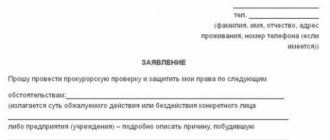Legal consultant Olesya Obizhaeva answers:
If in fact the money is not transferred to you, and you write a receipt stating that you received it, this will put you at an extreme disadvantage. Firstly, this contradicts the real facts, and secondly, the receipt is a document that is of a legal and legal nature, and should not be taken lightly. In judicial practice, there are many disputes that relate to receipts for receipt of funds.
Thus, if the buyer receives a receipt from you for the transfer of funds, then the amount that will be indicated there (20%) may in fact not be returned to you at all. You will have to prove in court the fact that the receipt was written under the influence of the buyer and that in fact no money was transferred. However, your chances of winning the trial are extremely low. Therefore, we recommend that you do not sign documents if they do not reflect reality. Let the buyer use other methods, look for the required amount and transfer it to you - then the receipt can be drawn up without problems.
Receipt for receipt of a deposit when renting an apartment
Receipts for receipt of a deposit and advance payment (prepayment) are the most common methods of advance payment when concluding an apartment rental agreement . The purpose of transferring funds in the form of a deposit or advance payment is to confirm the parties’ intentions to enter into a lease agreement for an apartment . A deposit and an advance payment (prepayment) have common features - funds are paid towards future payments, before the actual execution of the apartment lease agreement . The difference between an advance and a deposit is manifested in the consequences of failure to fulfill the obligation to conclude a rental agreement for an apartment. If the party who gave the deposit is responsible for the failure to fulfill the contract, it remains with the other party. If the party who received the deposit is responsible for non-fulfillment of the contract, he is obliged to pay the other party double the amount of the deposit. This rule does not apply to advance payments. The advance is returned, and the party guilty of disrupting the transaction does not bear any sanctions.
“...” …………………. 20… g.……………………
I, ………………………………………….……, passport ………. No………………… issued
…………………………………………… "……" ……………….. 20…. city, department code (name of the authority that issued the passport)
registered at:
city …………………… street …..……………………..… house …… building ……… apt …..
received from .…………………………………………, passport ………. No………………… issued
…………………………………………… "……" ……………….. 20…. city, department code (name of the authority that issued the passport)
registered at:
city …………………… street …..……………………..… house …… building ……… apt …..
as a deposit a sum of money in the amount of
……………………………………………………………………………………………. rubles, (in words)
towards future payment for the rental of property owned by me
……-room apartment located at the address: ……………….………………………
st. ……………………………………. house……………….. bldg. ……………… sq. …………..
The fact that I receive money means that I undertake to rent out this apartment
gr …………………………………………………………………………………………………………….
The conclusion of the lease agreement will take place no later than “……………………………. 20….. g.
Lessor ……………………………………/…………………….
“……………………. 20….. g.
Employer ……………………………………/…………………….
“……………………. 20….. g.
Note. Civil Code of the Russian Federation Chapter 23 Article 380. The concept of a deposit. Deposit agreement form
- A deposit is recognized as a sum of money given by one of the contracting parties in payment of payments due from it under the contract to the other party, as proof of the conclusion of the contract and to ensure its execution.
- The agreement on the deposit, regardless of the amount of the deposit, must be made in writing.
- In case of doubt as to whether the amount paid towards payments due from the party under the contract is a deposit, in particular due to non-compliance with the rule established by paragraph 2 of this article, this amount is considered to be paid as an advance unless proven otherwise.
Article 381. Consequences of termination and failure to fulfill an obligation secured by a deposit
- If the obligation is terminated before the start of its performance by agreement of the parties or due to the impossibility of performance (Article 416), the deposit must be returned.
- If the party who gave the deposit is responsible for the failure to fulfill the contract, it remains with the other party. If the party who received the deposit is responsible for non-fulfillment of the contract, he is obliged to pay the other party double the amount of the deposit.
In addition, the party responsible for failure to fulfill the contract is obliged to compensate the other party for losses, minus the amount of the deposit, unless otherwise provided in the contract.
Olga Belova, lawyer of the Samara Chamber of Lawyers, answers:
Any games with numbers in a contract are fraught with consequences, often irreparable. Of course, you can take from the buyer a receipt for a cash loan for the amount that he lacks to pay the down payment and for which the corresponding amount can subsequently be recovered. However, you should clearly understand: if we are talking about a significant amount, it will have to come from somewhere from the buyer - this time. Secondly, you need to understand that the buyer’s solvency must allow him to pay both the loan and the debt on the receipt. In other words, try to get as much information as possible from the buyer about his financial capabilities. I believe that in your case it is necessary to consider the possibility of registering a pledge of property: for example, a vehicle. For greater confidence, try to involve specialist lawyers in completing the transaction. Proper examination of documents and competent execution will help to foresee all possible consequences and avoid problems in the future.
How is money transferred when buying an apartment?
7 main mistakes when transferring money when buying an apartment
Rules for issuing a receipt for receipt of a deposit for a house and land plot
In order for the document to acquire full legal force, it will be enough to fill it out by hand, ensuring that it contains the following data:
- Full name of each party and their passport details;
- an indication of the exact amount of transferred funds in figures with clarification in writing, as well as a determination of the exact purpose of the transferred money;
- technical information about the property being transferred, including its area, cadastral number, and the size of the surrounding area;
- the exact date of execution of the transaction and signing of the receipt;
- signature of the person who previously owned the specified property, with a transcript.
When conducting a transaction, you should always insist that the former owner sign a receipt in the presence of not only the other party, but also several witnesses. At the same time, if you managed to draw up this document in the presence of third parties, it is highly recommended to indicate their passport details and signatures in the document. In this case, it will be possible to exclude any attempts to challenge the certified receipt in court if for some reason the former owner decides to say that he did not receive any money and they are trying to deceive him.
In the process of preparing all the documents necessary for a real estate purchase and sale transaction, you should prepare in advance a sample in accordance with which they should be filled out. Using a sample, you will be able to avoid some serious mistakes and save a lot of time that would have to be spent studying all the fields.
Main nuances
A loan is a transaction involving the transfer of property on credit from one person to another. Its obligatory condition is the return of this property.
Usually this concept refers only to cash loans. But the legislation allows for the possibility that a receipt will be drawn up for receipt of goods on credit (sample).
But most often the object transferred as a loan is money.
On the territory of Russia, any individuals and legal entities can give and receive loans.
Exceptions include persons whose legal capacity has been limited and other similar categories of citizens and organizations.
Important! A loan can only be provided by a credit (banking) organization. These concepts are quite similar, but it is necessary to distinguish them.
If at least one of the parties to the loan agreement is a legal entity, then it is always concluded in writing.
For individuals, such an obligation is established only for loan amounts exceeding 50 minimum wages.
In practice, it is virtually impossible to prove an oral loan agreement and it is always better to draw up a paper document. In some cases, a simple receipt can replace a contract.
Comment. Receipts for borrowing money from legal entities are extremely rare and should alert any lender.
Of course, there won’t be any big problems if the sole owner thus provides a loan for a short time to his own company, but in other cases it is better to draw up a full-fledged agreement.
The fact is that receiving money as a loan to a legal entity must be carried out according to accounting and a simple receipt will not get rid of it.
If the loan is taken out in foreign currency, this will also have to be noted on the receipt. In this case, it is also necessary to indicate at what specific rate the funds should be returned.
This point must be discussed before the deal is concluded. Otherwise, due to fluctuations in exchange rates, one of the parties can easily lose a very large amount, although when transferring funds they were thinking about completely different rules of the transaction.
Does it have legal force?
When issuing a loan, the parties can draw up a full written agreement or make do with just a receipt from the debtor. Both options for concluding a deal will be completely legitimate.
A receipt is actually a unilateral statement by the borrower (debtor) about the obligations assumed.
It must also reflect all the essential terms of the contract, for example, the presence or absence of interest, the term and procedure for repaying the debt, etc.
At the same time, the receipt also serves as a document confirming the actual transfer of funds.
It is in the presence of information that the borrower (debtor) actually received a specific amount of money (things) from the lender and the signature under this information of the borrower will confirm the fact of transactions.
The loan agreement is valid, i.e. acquires legal force only if there is confirmation of the transfer of property (money, things) from the lender to the borrower.
If the receipt stipulates only the terms of the transaction, but does not indicate the fact of receipt of funds (other property), then it will no longer play any role. It is important not to lose sight of this point.
Do I need to get it certified by a notary?
The question of whether it is necessary to have the borrower’s signature on a receipt certified by a notary is of interest to a fairly large number of participants in such a transaction.
Russian legislation does not contain such requirements. The borrower can simply write a receipt on any blank sheet of paper and that’s it.
But often the parties to a transaction prefer to have this document certified by a notary, hoping to protect themselves in this way.
Notarization of the transaction regarding the transfer of money on debt is not required.
A notary only provides services for certifying the signature of a specific person and sometimes gives certain advice.
If a dispute arises in court about whose specific signature is on a document, then the presence of notarized confirmation of the signature will play an unambiguous role. Without any examination, the court will know this fact accurately and for certain.
Important! The notary does not verify the accuracy of the receipt or any other information in it.
He only checks the passport details of the borrower and the person who signs and certifies this fact. This does not provide any additional money back guarantees.
If a receipt for receiving a loan is drawn up by a borrower from among the lender’s relatives, then there is no point in having it certified by a notary.
All statements about the falsification of a document can be easily refuted with the help of handwriting examination.
But if a complete stranger borrows money, then this situation will help avoid some types of fraud.
The fact of concluding a transaction can also be confirmed using the testimony of witnesses, if they were present at the conclusion of the transaction.
Information about witnesses must be included in the receipt. Otherwise, when disputes arise and in court proceedings, it will be very difficult to use their testimony.
Rules for transferring money
In order for the seller to issue a receipt for the down payment for an apartment purchased with a mortgage, he must receive the funds due to him. But how does the money transfer take place?
There are several methods of calculation:
- Cashless payments
- Depository (safety deposit box)
- Payment via notary deposit
- Letter of Credit
The first of them is rarely used when buying an apartment on the secondary market, although it is the simplest.
In the second case, the buyer places the required amount for a certain period in a safe deposit box. This method of transferring money is good when drawing up a mortgage agreement, since it allows you to demonstrate the transfer of money to the bank, while it will not fall into the hands of the seller until the actual agreement with the credit institution is concluded.
In this sense, the third method is also good. It implies that the notary registering the transaction accepts money from the buyer to his bank deposit, and then transfers it to the seller after the contract is executed. This service costs 1,500 rubles excluding bank commissions.
The fourth method is in some ways similar to using a safe deposit box, except that all payments are made on a non-cash basis. A letter of credit is a bank's obligation to transfer a specified amount of money from a client's account to a specific account.
Such a transfer is carried out upon fulfillment of any conditions (for example, upon presentation of a purchase and sale agreement) and within a specially agreed time frame.
Sample receipt for deposit when purchasing an apartment
When, after a long search, you finally find the home you have been dreaming about for so long, the problem of paying for it arises. Often, if the buyer cannot pay the entire amount at once or asks to postpone this moment to “think it over,” the seller has no choice but to ask him for a deposit - a small amount that will help him gain confidence in the buyer’s actions.
A receipt is a paper that is written in the name of the recipient of the money. It fully confirms that the seller has received the amount specified in the receipt, and in the future this document can be used to protect their rights in the event of a difficult situation.
Interesting: Find out okpo ip code by inn online
We lend money against a house!
- Completely safe!
We do not take receipts, we work according to the law and draw up an agreement with our clients that allows us to protect the rights of all parties.
- No need to “strain” friends or relatives!
You do not have to look for a guarantor who will confirm your solvency.
- Profitable!
Our clients are offered affordable rates, and the payment schedule can be drawn up in accordance with their wishes and capabilities.
- No proof of income is required!
People who are not currently working can come to us; we do not require a salary certificate.
- Large sums!
Using real estate as collateral, borrowers can receive up to 70% of the value of the property, which is a large amount; depending on the price of the property, it can be up to several million.
- We are not wasting time!
Fast approval - it takes 1 business day to review your application. During this period, a decision is made and all documents are drawn up.
- We are not interested in your past, we do not check your credit history!
If you have been rejected by all banks, but you want to take out a loan against a house, you can always get money against a receipt from us.
Attention!
The repayment schedule is drawn up taking into account the wishes of the borrower and is agreed upon with him before the conclusion.
How is a security deposit issued?
Thus, specialized equipment can be very expensive, but it is unacceptable as collateral for a loan, since its sale will either take a lot of time or it will not be possible to sell it at all. The mortgage receipt, which is provided to the borrower by the lender, can be used if the parties so desire. A rather expensive handwriting examination is prescribed.
When notarized, such a procedure is not carried out, because the authenticity of the document and the identity of those involved in the receipt were verified by a notary.
Although the security document does not have an official form, depending on the object, the pledge agreement has its own characteristics.
The transfer of funds against mortgaged property is the norm in lending relationships.
A citizen, having drawn up security and loan agreements and written a receipt for the pledge, can receive the necessary funds, using the existing property as a guarantor. Mortgage loans are widely used by banks and private investors as mortgages and cash against personal properties.







